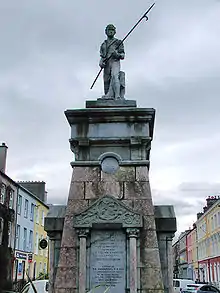Croppy
Croppy was a nickname given to Irish rebels fighting for independence from Britain during the 1798 Rising.
Origin
The name "Croppy" used in Ireland in the 1790s was a reference to the closely cropped hair associated with the anti-powdered wig (and therefore, anti-aristocratic) French revolutionaries of the period. Men with their hair cropped were automatically suspected of sympathies with the pro-French underground organisation the Society of United Irishmen, and were often seized by the British administration and its allies for interrogation; they were also subjected to torture via methods such as flogging, picketing and half-hanging. The contemporary torture known as pitchcapping, or An Caip Bháis in Irish, was specifically invented to intimidate Croppies. United Irish activists retaliated by cropping the hair of Ulster loyalists to reduce the reliability of this method of identifying their sympathisers .
See also
References

- The name is referenced in the title of two folk-songs of the period: the Loyalist song, Croppies Lie Down and the rebel song The Croppy Boy.
- The memorial park in front of Collins Barracks, Dublin (now a part of the National Museum of Ireland) is known as Croppies' Acre, as the remains of people executed during and after the 1798 Rising were dumped there for the incoming tide of the tidal Liffey to remove; it was long thought they had been buried there.
- In the church at Crooke, County Waterford, there is a marker to indicate the grave of the Unknown Croppy, (the "Unknown Soldier" of the rebellion) as the nearby Passage East and Geneva Barracks were sites of execution and transportation of many Irishmen. (The GPS coordinates for the grave of the Croppy Boy are N 52° 13.642' W006° 58.756' and the GPS coordinates for Geneva Barracks are N 52° 13.042' W006° 58.737'.)
- The Pikeman Memorial in Tralee, a sculpture of a United Irishman commemorating the 1798 Rising, is known locally as The Croppy Boy.
- Seamus Heaney commemorated the fate of thousands of fallen United Irishmen in his 1966 poem Requiem for the Croppies.[1]
- The term is used throughout Leon Uris' historical novel on Ireland, Trinity.

